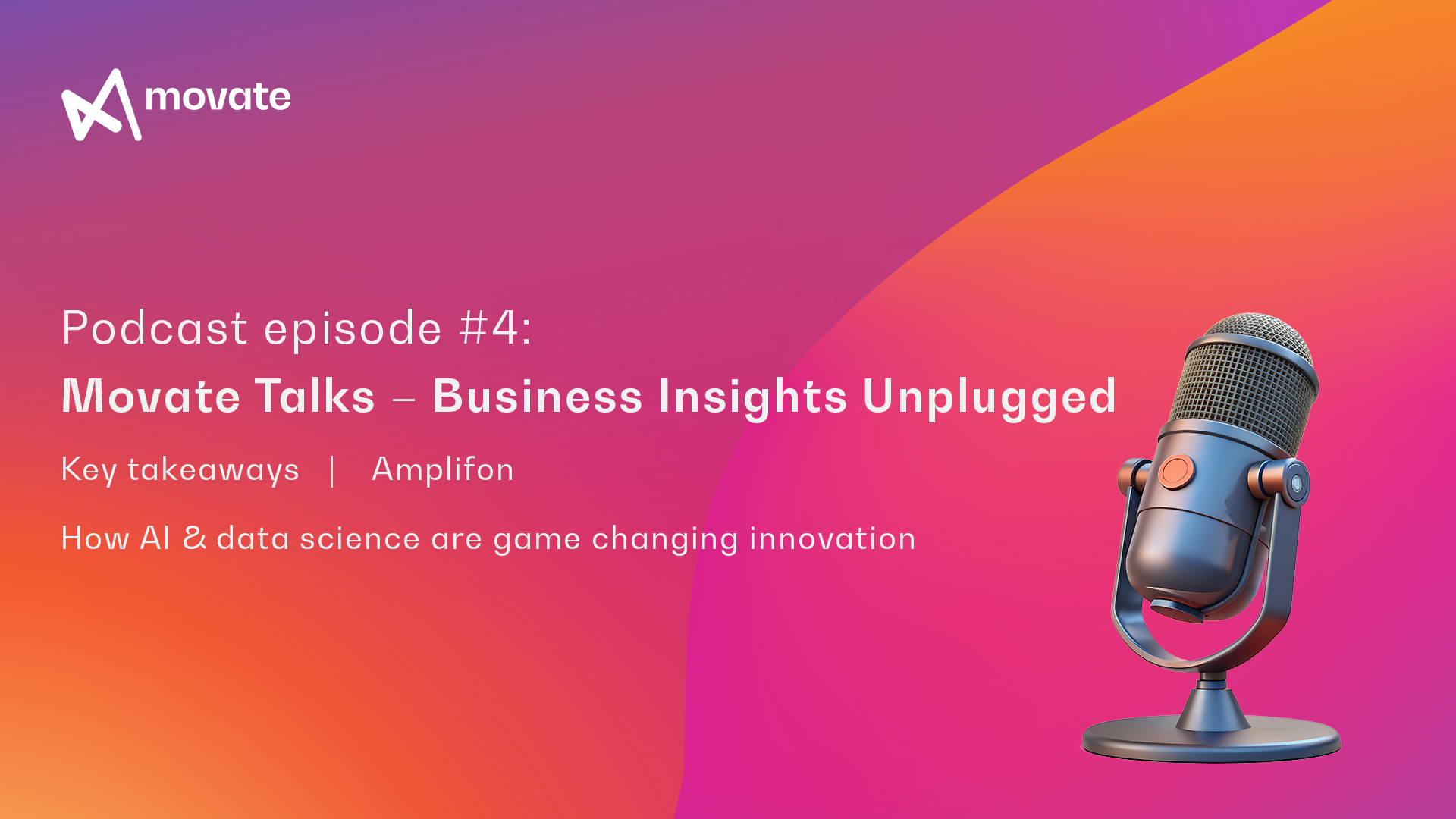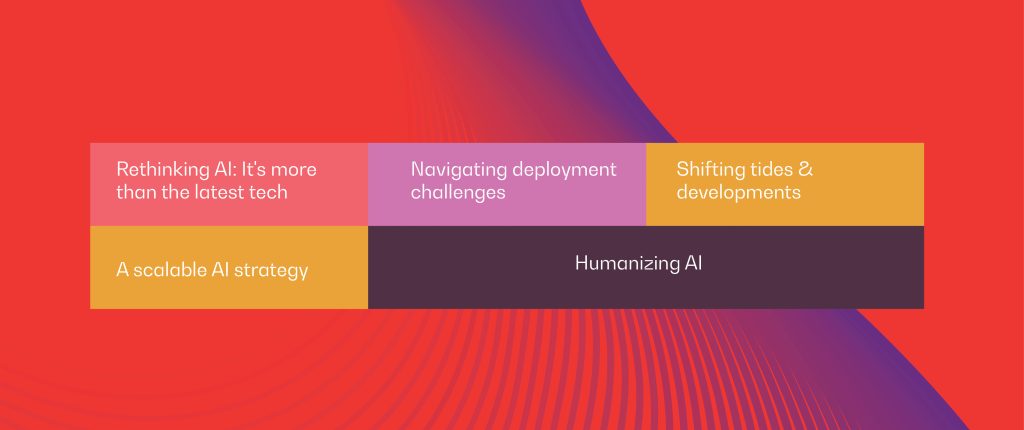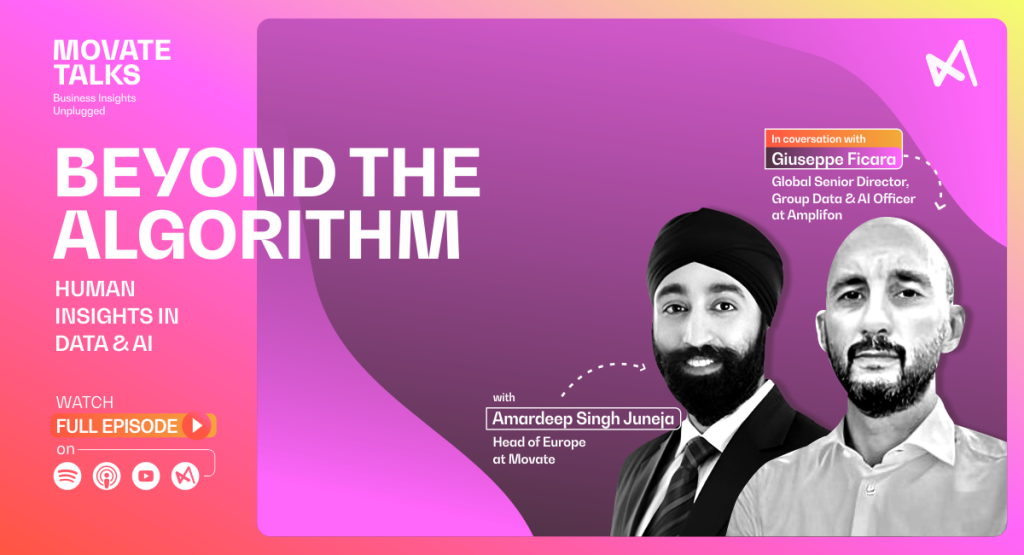
Podcast #4: Conversation with Amplifon’s Data and AI Officer
In episode #4 of Movate Talks: Business Insights Unplugged, Giuseppe Ficara, Group Data and AI Officer at Amplifon, shared invaluable insights on leveraging data and AI to drive business transformation. With over 15 years of experience in consulting roles at Deloitte and Accenture, Giuseppe has a unique perch into the “on-the-ground” developments in technology. He offers his views on steering through the evolving landscape of data governance, AI adoption, and digital transformation.
Here are the interesting takeaways from the episode.

Rethinking AI: It’s more than the latest tech
A core theme Giuseppe emphasized is that successful AI implementation is not solely about having the most advanced tools. Instead, it’s about changing how people work.
Drawing a parallel with The Marshmallow Challenge where kindergarteners outperformed executives by iterating rather than overplanning, Giuseppe urged organizations to cultivate a culture of experimentation. He noted, “AI and data are not just about technology but about rediscovering the ability to experiment with new solutions.”
Encourage a “test-and-learn” culture in the company; empower teams to innovate uninhibited by fear/failure.
Navigating AI deployment challenges
When it comes to rolling out complex AI and data programs, Giuseppe identified three main challenges:
- Data governance: Despite technological advances, inconsistent or inaccessible data remains a bottleneck. Amplifon overcomes this by treating data as a product and giving business units ownership, ensuring quality and usability.
- Regulatory compliance: With emerging regulations like the EU AI Act and GDPR, navigating cross-border compliance is critical. Building systems aligning with local and international laws is not optional; it’s foundational to enterprise security.
- Cloud migration: Transitioning to cloud infrastructure provides the flexibility to scale up systems for seamless data access across geos, which was not easy with the traditional legacy approach. Amplifon’s federated data governance model enables both global consistency and local flexibility.
“Having data sovereignty to standardize centrally but also the ability to provide regional accessibility or flexibility across geos to adopt and adapt based on their local regulatory compliances is challenging but essential.” – Amardeep Juneja, Head of Europe – ITO.
Shifting tides and developments
The developments in AI from a ‘predictive’ engine to a ‘copilot’ for strategic decisions are clear. Giuseppe elaborated on how GenAI is already boosting productivity, personally and professionally. From personalized travel planning using AI tools to streamlining customer support and R&D, the applications are limitless. He emphasized 3 high-impact outcomes AI brings to businesses:
- Process optimization: Automating routine tasks to free up teams for more strategic work.
- Hyper-personalization: Transforming customer experiences, especially in marketing and health tech sectors.
- Enhanced decision-making: AI-powered copilots augment/empower the workforce and help enterprise leaders make informed, real-time decisions.
The future of AI lies in its cross-functional enterprise integration, not just tools working in silos.

A scalable AI strategy: Advice for leaders
For fellow Chief Data and AI Officers, Giuseppe shared 3 pillars for crafting a resilient AI strategy:
- Business realignment: Focus on the impact. Every AI charter should support business goals, whether cost efficiency or faster delivery.
- Cross-functional collaboration: AI isn’t just an IT responsibility. Successful adoption requires input from all functions, including marketing, security, compliance, etc.
- Scalability & change management: Beyond the tech stack, the real challenge is people. Organizations must invest in adoption plans and change management frameworks.
The technology is excellent but remember it’s new and the margin of failure is wide. Integrating it into processes that have long existed is a big change. While technology processes change, the biggest factor is human change management.
Significance of humanizing AI
One of the most powerful parts of the discussion that Giuseppe noted was the need for the “emotional” or “empathy” factor in the use of AI, especially in health tech (hearing healthcare). Humans are in charge of AI, and hence having a human in the loop is the responsible approach to AI. Ethical AI use isn’t a “nice to have;” it’s essential for building trust and value over the long haul.
The human aspect: At Amplifon, helping a customer hear the sounds of life for the first time is an emotional moment. It’s not just about managing ‘cold’ technology or processes but about touching lives.
In the enterprise AI story, it’s not about one person or one function behind the success but involving a broad cross-functional team representation for the overall success of the enterprise. From innovation labs, security, marketing and so on, involve everyone in the journey.
No one person can decide which is the best AI tool or use case to develop. Teamwork is essential to prioritize investments and work on use cases.
Personal views and final thoughts
As the conversation drew to a close, he shared two lessons:
- On a professional note, embrace the marshmallow mindset to experiment, adapt, and iterate rather than aiming for perfection.
- From a personal front, stay curious. Continuous learning opens the door to new opportunities in work or life.
This episode highlighted that while AI defines how enterprises operate, its authentic impact lies in how we adapt and humanize CX. It was a delight to showcase leaders like Giuseppe, who are reshaping the future with innovation and empathy. These insights help AI leaders and anyone navigating the warp speed of change in the industry.
Watch this space for more blogs on Movate Talks: Business Insights Unplugged episodes as we explore the intersection of technology, leadership, and impact.
Related information
